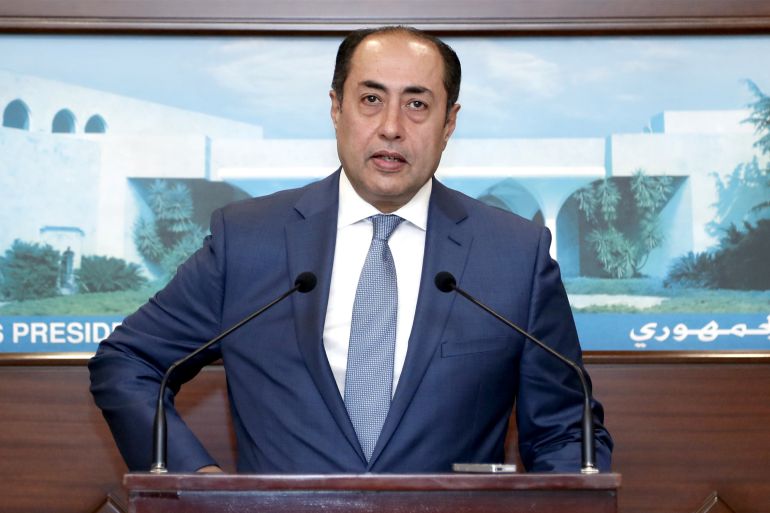Arab League hails ‘positive’ talks with Lebanon over GCC row
Assistant Secretary-General Zaki says he is willing to go to Saudi Arabia to help resolve the diplomatic crisis.

Beirut, Lebanon – Talks with Lebanese officials to resolve a diplomatic rift with Saudi Arabia and other Gulf countries have been “positive”, Arab League Assistant Secretary-General Hossam Zaki says.
Zaki’s Arab League delegation arrived in Beirut on Monday to hear the Lebanese point of view in a first step to resolve the crisis triggered by comments made by Lebanon’s information minister that criticised the Saudi-led coalition’s war in Yemen.
Keep reading
list of 3 itemsArab League ‘concerned’ by ‘deteriorating’ Lebanon-Gulf ties
Saudi Arabia, UAE summon Lebanon envoys over Yemen war criticism
“We came to see whether there is a possibility to bring together the different perspectives,” he told the press this morning.
He said he was willing to travel to Saudi Arabia to help resolve the crisis if necessary, and wants to find an “appropriate exit” out of the rift that suits both Lebanese and Gulf countries’ interests.
The delegation met with President Michel Aoun, Prime Minister Najib Mikati, Speaker Nabih Berri and Foreign Minister Abdallah Bouhabib.
President Aoun said in a statement that he welcomed attempts from the Arab League to rekindle ties with Saudi Arabia through dialogue.
He called for the separation of the Lebanese government’s official positions from those of individuals or political parties, “especially as they were not issued from a position of authority”.
A diplomatic row between Lebanon and several Gulf countries was sparked in October after video footage circulated online from an August interview in which Information Minister George Kordahi made critical remarks about the Saudi-led coalition’s war against Houthi rebels in Yemen.
The former game show host said the Iran-aligned Houthis are “defending themselves … against an external aggression”.
In response, Saudi Arabia, the United Arab Emirates, Kuwait, and Bahrain recalled their envoys from Beirut and expelled their Lebanese ambassadors.
Saudi Arabia also banned all imports from Lebanon, impacting what experts say is some 6 percent of the cash-strapped country’s total exports and escalating an earlier partial ban.
Bahrain and the UAE have called on their citizens to leave the country, while Yemen has also since recalled its envoy from Beirut.
After meeting Berri on Monday, Zaki said that Kordahi’s resignation was “somewhat on the table”, and that stepping down could have defused the crisis in the first place.
Mikati has repeatedly called for mending relations with Saudi Arabia and Gulf countries, while Aoun and Bouhabib have called for direct dialogue.
Qatar has offered to send its foreign minister to mediate and help resolve the crisis.
Kordahi has refused to resign, and insists that his comments were his personal opinion and made before taking office.
Saudi Arabia has distanced itself from Lebanon in recent years, often criticising it for Iran-backed Hezbollah’s growing influence in Lebanese politics. Kordahi was appointed by the Marada Movement, a Christian party closely allied to Hezbollah and Syrian President Bashar al-Assad.
Hezbollah, which Saudi Arabia considers a “terrorist” organisation, backs the Houthis in Yemen and has praised Kordahi for his remarks.
“[Hezbollah] made Lebanon an arena and a launching pad for implementing projects of countries that do not wish well for Lebanon and its brotherly people,” a Saudi statement issued on October 29 read.
Meanwhile, Hezbollah Deputy Secretary-General Naim Qassem last week called on Saudi Arabia to apologise for what he said was an “aggression” on cash-strapped Lebanon. Secretary-General Sayyed Hassan Nasrallah is set to speak about the issue for the first time in a speech later this week.
Relations between Lebanon and Saudi Arabia were already strained, with the latter having imposed an indefinite ban on Lebanese agricultural produce in April after foiling an attempt to amphetamines in fruit.
In May, Lebanon’s then-caretaker Foreign Minister Charbel Wehbe resigned after insinuating that Gulf countries were behind the rise of ISIL (ISIS) in a heated argument with Saudi lobbyist Salman al-Ansari on Alhurra TV.
The diplomatic crisis has also heightened the existing political paralysis and tensions between parties in Lebanon. The cabinet has not met in almost a month, already riven by disputes over Beirut blast investigation led by Judge Tarek Bitar.